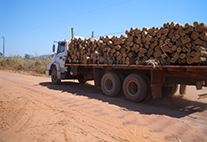Clearing the Tropical Rainforests: the Paris Climate Agreement would allow write-offs
22 July 2016, by CEN Universität Hamburg

Photo: UHH/CEN/Köhl
News from Climate Science: Once a month, climate researchers report on their latest findings in the newspaper "Hamburger Abendblatt". Michael Köhl investigated how the new Paris Climate Agreement could affect the rainforests.
The new United Nations climate agreement negotiated in Paris at the end of 2015 is regarded as a success around the globe. One of the planned changes, however, could have unintended consequences. To date, technologically advanced and less advanced countries have been classified as Annex 1 or Non-Annex 1 countries, but this classification will now be done away with. At the Center for Earth System Research and Sustainability, we have investigated what this could mean for the tropical rainforests.
The rainforests are not only the Earth’s “green lungs”; they also store tremendous amounts of carbon in their trunks, branches and leaves. When trees are felled, that storage can be jeopardized. If the wood rots or is burned, the carbon is released into the air in the form of climate-harmful CO2. Currently, one fifth of all global greenhouse-gas emissions are the result of deforestation.

Investigates the tropical rainforest: Prof. Michael Köhl (Photos: UHH/CEN/Köhl).
If, on the other hand, the wood is used in long-lasting products like furniture, window frames and roof beams, the carbon remains in the wood – and has no negative effects on the climate. This is the case in Europe, where the commercial forests are sustainably regulated and the sawmills are not only efficient, but also recycle waste wood into new products. If wooden window frames are used to replace energy-intensive products like aluminum frames, the carbon balance is actually positive. Paradoxically this means that, in this case, felling trees is better for the environment than leaving them standing.
That’s why a bonus scheme was introduced in 2009, but only for the technologically advanced Annex 1 countries. This allowed felled trees used for long-lasting wooden products to be written off. Under the new Paris Climate Agreement, as of 2020 this bonus scheme is to be extended to less-developed countries that are home to large rain forests. Does that make good sense?
For example, Indonesia currently plans to clear 20 percent of its tropical forests over the next decade so the land can be used for agricultural purposes. Under the old climate agreement, the country would have been charged for the full amount of resulting harmful emissions. Since that could have been quite expensive, it gave states with such plans an incentive to consider the alternatives.
If the new agreement goes into effect as planned, Indonesia will be able to claim that it is producing durable wooden goods. In part, this will also actually be the case, which would make it fair.
This potentially tricky issue moved us to carefully investigate logging in tropical regions. Using different scenarios, we calculated the efficiency of local logging practices, the production processes and timber use. The findings show: even in the logging stages, there are huge losses. Only 15 to 50 percent of the trees that are cut down actually leave the forest. The rest remains where it fell and gradually decays, releasing carbon dioxide.
What’s more, in the sawmills, only about 30 percent of the harvest is used, with the rest usually being burned. The result: deforestation leads to disastrous emissions balances in many tropical countries. And even introducing more efficient logging practices would do little to improve the situation. Unlike Europe’s monoculture commercial forests, tropical forests consist of both usable and non-usable trees, mixed with lush undergrowth. As a result, countless plants are cut down incidentally during logging.
Accordingly, the use of tropical timber can never be climate neutral. But it’s not just about emissions: The Earth could also lose vast expanses of an untouched ecosystem – an incalculable loss.
More Information
Related study in "Carbon Balance and Management"
Harvested wood products and REDD+: looking beyond the forest border
Contakt Prof. Michael Köhl
